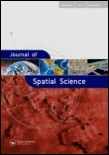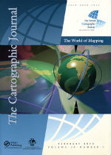
Information Geographique
Scope & Guideline
Navigating the Complexities of Geography
Introduction
Aims and Scopes
- Exploration of Urban and Rural Dynamics:
The journal examines the relationships between urban and rural areas, particularly focusing on small towns and intermediary cities, their planning, development, and socio-economic challenges. - Geopolitical and Environmental Studies:
Research includes analyses of geopolitical influences, environmental changes, and their societal implications, particularly in the context of crises such as climate change and conflict. - Integration of Geographic Information Systems (GIS):
A significant emphasis is placed on the use of GIS and spatial analysis methods to study various geographical phenomena, enhancing understanding of complex spatial relationships. - Socio-spatial Inequalities:
The journal addresses issues of social justice, inequalities, and the role of geography in shaping socio-economic disparities, particularly in urban settings. - Anthropocene and Educational Perspectives:
There is a critical focus on the Anthropocene, exploring its implications for geography education and public understanding of environmental issues.
Trending and Emerging
- Focus on Small Towns:
There is an increasing interest in small towns, their roles in urban-rural dynamics, and their socio-economic challenges, particularly in the context of demographic changes and planning. - Climate Change and Urban Resilience:
Recent papers highlight the impacts of climate change on urban and rural areas, emphasizing the need for resilience and adaptation strategies in geographical research. - Geopolitical Conflicts and Geography:
The exploration of geopolitical conflicts, such as the Ukraine war, illustrates a growing trend in analyzing how geography intersects with political power and influence. - Participatory and Community-Based Approaches:
Emerging themes include participatory geography and community engagement in planning and environmental management, reflecting a shift towards inclusive research methodologies. - Education in the Anthropocene:
A notable trend is the emphasis on geography education within the context of the Anthropocene, focusing on how educational practices can respond to global environmental challenges.
Declining or Waning
- Traditional Urban Studies:
Research focusing solely on traditional urban studies without integrating contemporary issues like climate change or social justice has become less frequent, indicating a shift towards more holistic approaches. - Historical Geographic Analysis:
While historical perspectives are still relevant, there has been a noticeable decline in papers that focus exclusively on historical geographic analysis without connecting to current socio-political contexts. - Static Geographic Models:
Static models of geography that do not incorporate dynamic changes or contemporary challenges (like globalization or technological advancements) are appearing less frequently in the journal. - Localized Environmental Studies:
Themes centered on localized environmental studies without a broader geopolitical or global perspective have diminished, suggesting a shift towards more integrative environmental research. - Conventional Tourism Studies:
Studies that address tourism in a conventional manner without engaging with concepts like over-tourism or its socio-economic impacts are becoming less common.
Similar Journals

Revue Internationale de Geomatique
Transforming Spatial Data into Actionable KnowledgeRevue Internationale de Geomatique (ISSN: 1260-5875, E-ISSN: 2116-7060) is a prestigious journal published by TECH SCIENCE PRESS, dedicated to advancing the field of geomatics. This journal serves as a vital platform for disseminating significant research findings, cutting-edge methodologies, and innovative applications within the realm of spatial data and technology. With an emphasis on interdisciplinary studies, it fosters collaboration among researchers, professionals, and students across various domains, including environmental science, urban planning, and geographic information systems (GIS). Although not an open-access journal, Revue Internationale de Geomatique maintains a rigorous peer-review process ensuring the publication of high-quality articles that contribute to the evolving landscape of geomatics. Given its relevance and commitment to scholarly excellence, this journal is a crucial resource for advancing knowledge and practices in the ever-growing field of spatial information science.

GEOgraphia-UFF
Navigating the Landscape of Contemporary GeographyGEOgraphia-UFF is an esteemed open-access journal dedicated to the dissemination of innovative research and scholarship in the field of geography. Published by Universidade Federal Fluminense since 2014, this journal serves as a vital platform for researchers, professionals, and students to explore a diverse array of geographical topics, from human-environment interactions to urban studies and spatial analysis. With a pronounced commitment to accessibility and knowledge sharing, GEOgraphia-UFF promotes a collaborative academic environment, fostering dialogue and critical engagement among scholars worldwide. Located in the picturesque region of Rio de Janeiro, Brazil, the journal aims to bridge local insights with global geographical challenges, ensuring relevance and impact in the ever-evolving discourse of our discipline. This journal is an indispensable resource for anyone looking to stay at the forefront of geographical research.

Anales de Geografia de la Universidad Complutense
Illuminating the Intersection of Geography and SocietyAnales de Geografia de la Universidad Complutense is a prominent journal in the fields of Geography and Urban Studies, published by Universidad Complutense de Madrid. With a rich academic tradition since its inception, this journal has been open access since 1981, ensuring that valuable research is readily available to scholars and practitioners alike. The journal holds a significant position within the academic community, reflected in its Q3 ranking in both Geography, Planning and Development and Urban Studies categories as of 2023, and it provides an essential platform for interdisciplinary research and dialogues on pressing geographical and urban issues. As part of the Scopus indexed database, it ranks #201 out of 279 in Urban Studies and #684 out of 821 in Geography, indicating its growing influence and relevance. Based in Madrid, Spain, the journal welcomes contributions that aim to advance knowledge, foster collaboration, and stimulate critical thinking in these dynamic fields.

PAPERS IN REGIONAL SCIENCE
Fostering collaboration for impactful regional science.PAPERS IN REGIONAL SCIENCE, published by Wiley, is a leading international journal dedicated to advancing the understanding of regional science and interdisciplinary approaches to geography and environmental planning. With an impressive impact factor and a prestigious Q1 ranking in both Environmental Science and Geography, Planning and Development, this journal serves as a critical platform for disseminating high-quality research from 1955 to 2024. Covering a diverse scope including regional development, spatial analysis, and environmental issues, it facilitates discussion and knowledge exchange among scholars and practitioners. The journal is recognized for its rigorous peer-review process and its commitment to addressing pressing societal challenges through research. As a vital resource for researchers, professionals, and students alike, PAPERS IN REGIONAL SCIENCE fosters innovation and collaboration within the field, contributing to a deeper understanding of the complexities of regional systems.

Cadernos de Geografia
Unveiling New Dimensions in Geographical StudiesCadernos de Geografia is a distinguished biannual journal published by UNIVERSIDADE DE COIMBRA, FACULDADE DE LETRAS, dedicated to the field of geography and related social sciences. With its ISSN 0871-1623 and E-ISSN 2183-4016, this journal has been a prominent platform for the dissemination of high-quality research since it became open access in 2012. Situated in Coimbra, Portugal, it aims to foster academic excellence by providing an inclusive space for innovative studies that explore contemporary geographical issues. Cadernos de Geografia encourages submissions that address diverse aspects of geography, ranging from environmental studies to urban planning, making it an invaluable resource for researchers, professionals, and students alike. As a part of the growing trend in open-access publishing, it enhances the global reach and accessibility of geographical research, thereby contributing to the enrichment of knowledge in the field.

Journal of Spatial Science
Illuminating Connections in Atmospheric and Energy ResearchThe Journal of Spatial Science, published by Taylor & Francis Ltd, serves as a prominent platform for the dissemination of research in the interdisciplinary fields of geography, atmospheric science, and energy. With an ISSN of 1449-8596 and an E-ISSN of 1836-5655, this journal has established itself as a vital resource since its inception in 2004, boasting an impressive convergence period extending to 2024. Recognized in the Q3 quartile for Atmospheric Science and Energy (miscellaneous), and achieving a Q2 classification in Geography, Planning and Development in 2023, the journal not only reflects the evolving complexities of spatial science but also underscores its increasing relevance in addressing contemporary global challenges. The journal holds a commendable position in Scopus rankings, with notable placements in various categories, further highlighting its academic significance. Researchers, professionals, and students are encouraged to engage with the rich content offered, as the Journal of Spatial Science remains committed to advancing knowledge and fostering discussions pertinent to spatial analysis and its applications.

Geo UERJ
Advancing Research for a Sustainable FutureGeo UERJ is a renowned open-access journal published by Universidade do Estado do Rio de Janeiro (UNIV ESTADO RIO JANEIRO), focused on the multifaceted study of geography and related disciplines. Established to foster innovation and disseminate high-quality research, Geo UERJ has been dedicated to making scholarly work accessible since its transition to open access in 2007. The journal aims to provide a platform for researchers, professionals, and students to share insights into geographical phenomena, environmental issues, and urban studies, contributing to the global discourse on sustainability and spatial analysis. Its publications serve as valuable resources for academicians looking to stay abreast of cutting-edge developments within the geography field. With the ISSN 1415-7543 and E-ISSN 1981-9021, Geo UERJ invites contributions from diverse perspectives, enriching the academic landscape with important geographic research from Brazil and beyond.

CARTOGRAPHIC JOURNAL
Advancing Insights in Earth-Surface ProcessesThe Cartographic Journal, published by Taylor & Francis Ltd, stands at the forefront of the field of cartography and geographic information systems. Established in 1964, this quarterly journal has been a pivotal platform, fostering academic discourse and research in Earth-Surface Processes, evidenced by its impressive Q2 ranking and a Scopus status reflecting its relevance in the discipline. With an ISSN of 0008-7041 and an E-ISSN of 1743-2774, the journal circulates a wealth of insights and innovations essential for researchers, professionals, and students devoted to understanding the complexities of geographic representations. While it maintains a traditional subscription model, its integrity and contributions are well-recognized in the UK and globally, supported by a mission to enhance cartographic education and stimulate advancements in spatial data analysis. As it converges its focus through 2024, The Cartographic Journal continues to illuminate the evolving landscapes of geography and cartography, making it an indispensable resource for anyone invested in these dynamic fields.

Annals of the American Association of Geographers
Advancing Knowledge in Spatial Analysis and Human GeographyAnnals of the American Association of Geographers is a leading academic journal published by Routledge Journals, Taylor & Francis Ltd, and is based in the United Kingdom. With an impact factor positioning it in the Q1 category for both Earth-Surface Processes and Geography, Planning and Development, it stands as a pivotal resource for researchers and professionals in the fields of geography and environmental sciences. The journal’s broad scope accommodates a diverse range of topics, including spatial analysis, environmental change, and human geography, reflecting the dynamic nature of geographical research. Accessible in both print and digital formats, the journal encourages open dialogue and dissemination of knowledge among its authors, readers, and the academic community. As it converges through the years from 2016 to 2024, the Annals continues to showcase high-quality research that influences geographic thought and practice, making it essential reading for students, academics, and practitioners alike.

Geo-Spatial Information Science
Connecting Researchers and Practitioners through Geospatial InsightsGeo-Spatial Information Science, published by TAYLOR & FRANCIS LTD, is a premier open-access journal that has been at the forefront of disseminating cutting-edge research since its inception in 1998. With an ISSN of 1009-5020 and an E-ISSN of 1993-5153, this journal plays a pivotal role in the fields of Computers in Earth Sciences and Geography, Planning and Development, achieving a prestigious Q1 ranking in both categories as of 2023. Its exemplary Scopus rankings highlight its relevance within the social sciences and earth sciences, placing it among the top echelons of its field, with a 95th and 93rd percentile respectively. The journal aims to bridge the gap between innovative geospatial technologies and their applications in real-world scenarios, fostering interdisciplinary collaboration and advancing the global understanding of spatial data analysis. Based in the United Kingdom, Geo-Spatial Information Science invites researchers, professionals, and students to contribute and access research that shapes the future of geo-spatial sciences, all while adhering to open access principles that ensure broad dissemination and engagement with the broader academic community.